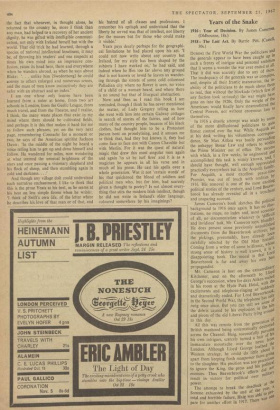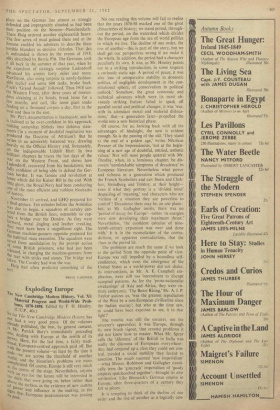Years of the Snake
DURING the First World War the politicians and the generals appear to have been caught up in such a frenzy of intrigue and personal ambition that it seems a wonder the war ever ended at all. That it did was scarcely due to any of them' The inadequacy of the generals was so complete, and, despite all their frantic manoeuvres, the in- ability of the politicians to do much about the so real, that without the blockade (which few of any faction took seriously) the war might have gone on into the 1920s. Only the weight of the Americans would finally have steamrollered the Central Powers, not without enormous loss to themselves.
In 1916 a drastic attempt was made by some of the more disillusioned politicians to gain firmer control over the war. While Asquith sat at his desk writing his voluminous correspon- dence, Sir Max Aitken was busily persuading the unhappy Bonar Law and others to winkle the Prime Minister out of office. The success with which, in a few weeks, he engineered and accomplished this task is widely known, and, should have thought, well enough appreciated practically everywhere but in the Asquith family For Asquith, a most excellent peace-time Premier, was out of touch with realities by 1916. His removal is one of the most exciting political stories of the century, and Lord Beaver- brook has already revealed all in a trenchant and unsparing account. James Cameron's book sketches the poli tical background to 1916 once again. It has no illus- trations, no maps, no index and, most eccentrif, of all, no documentation whatever (a `difficult and invidious' task, Mr. Cameron says, blancllY) He does present some previously unpublished documents from the Beaverbrook archives; t the pickings, presumably, have already hehe,u,° carefully selected by the Old Man httoseaL0 Coming from a writer of some brilliance, wh°sa strong sense of history is well known, it IS d disappointing book. The moral is that (.,o, Beaverbrook is far and away his own best propagandist. Mr. Cameron is best on the extraordinall Kitchener, and on the aftermath to LloYd waited George's succession, when for days Aitken wa in his room at the Hyde Park Hotel, with the ly excitements and telephone-ringing so suc:lent, and dramatically ended. For Lord Beaverbro in the Second World War, the telephone has °r101Y1 rung once since. But you can still see sour bits the debris caused by his explosion in the rid taondthpisieedeasyof the old Liberal Party lying ar°u All this was remote from the generation of British manhood being systematically destr°Y.e_ct- across the Channel. Haig, successfully pursuhis his own intrigues, scarcely turned a hair of orn immaculate moustache over the news fr
London. Although Lloyd George d the Western strategy, he could do little abouoting apart from keeping fresh manpower fronl
s to the slaughter. His position was too precTiitrcat to ignore the King, the press and his P.° not enemies. Thus Beaverbrook's efforts did.
result in victory for political over military p loathe it
Somme T he a et t exhausted power. of the Yea total and horrible failure, Haig was ablewtar:
one pare for another effort in 1917. There
putstetdo by thetheenddeadlock at the place on the German line almost as strongly defended and impregnably situated as had been their position on the Somme—Passchendaele. There Haig ordered another nightmarish heave. The few acres of mud gained there and at the Somme enabled his admirers to describe these terrible blunders as decisive victories. That this is unfounded is shown by the events of 1918, ably described by Barrie Pitt. The Germans took it all back in the summer of that year, when by the expedient of strategic surprise Ludendorff advanced his armies forty miles and more. Rawlinson, also using surprise (a newly-fashion- able tactic) and some 600 tanks, broke back. Foch's 'Grand Assault' followed. Thus 1918 saw the Western Front, after three years of tremen- dous straining at its bonds, break loose for a few months, and curl, like some giant snake feeding on a thousand corpses a day, first to the west and then to the east.
Mr. Pitt's documentation is inadequate, and he is inclined to be over-confident in his approach, rushing somewhat blithely into dubious state- ments (`in a moment of doubtful inspiration was produced the Doctrine of Attrition'). But he writes in an admirably balanced way, drawing heavily on the Official History and, fbrtunately, on the indispensable Liddell Hart. In two brilliant chapters he traces the last days of the War on the Western Front, and shows how Ludendorff, recovered from his breakdown, was fully confident of being able to defend the Ger- lien border. It was famine and revolution at 11„culle which did for Kaiser Bill in the end. With little glory, the Royal Navy had been conducting lie of the most efficient and ruthless blockades of history. November 11 arrived, and GHQ prepared for a final gesture. Ten minutes before the Armistice was due to begin, a squadron of cavalry can- tered from the British lines, ostensibly to cap- Lure a bridge over the Dendre. As they went they mustLerman have been a magnificent sight. The Lerman machine-gunners opposite prepared for the habitual mass execution. The squadron were "dyed from annihilation by the prompt action ureri some British prisoners, who had just been eased, in charging the machine-gunners from the rear with sticks and stones. The bridge wag' taken The Cavalry had won the war.
Haig had often predicted something of the sort.
BRIAN GARDNER











































 Previous page
Previous page